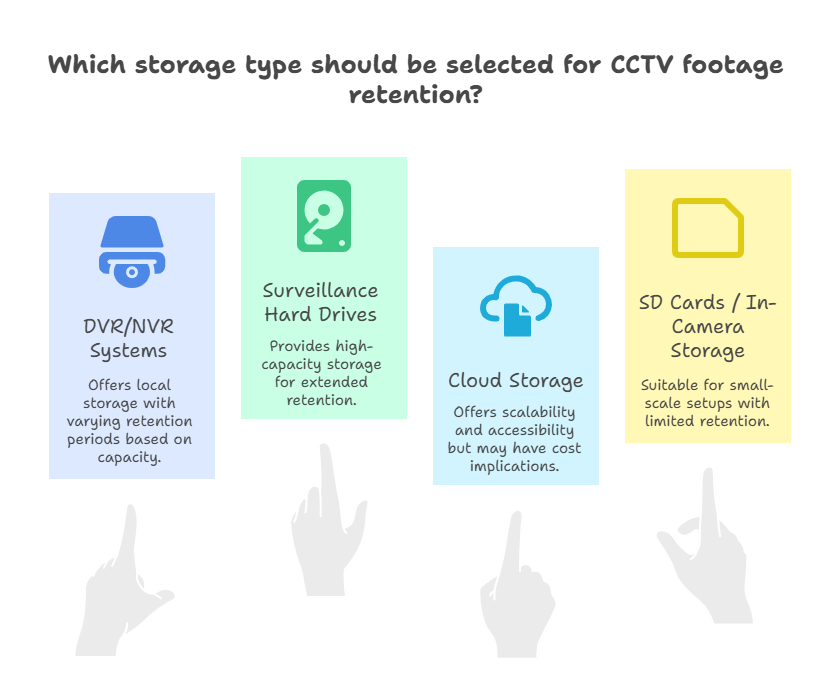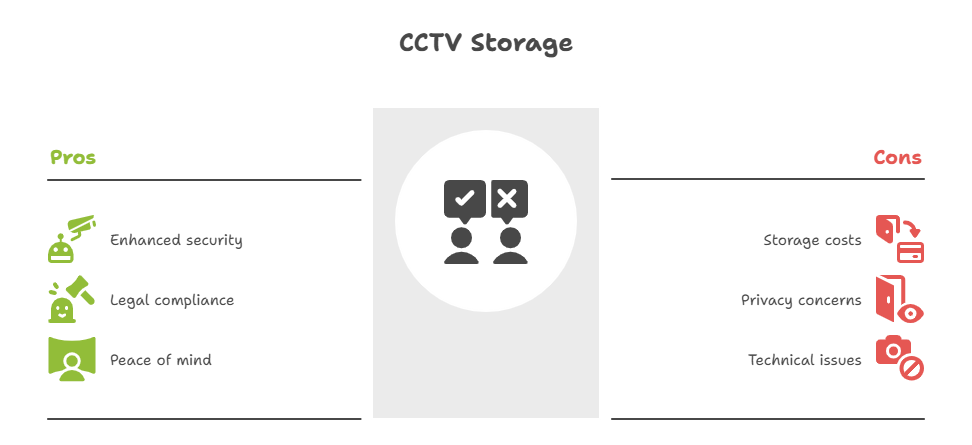In the present day, under 24-hour surveillance, the presence of security cameras has become as common as locks on doors. But the crucial question arises when cameras start recording: how long CCTV footage is kept? Anyway, whether you’re a homeowner wanting to keep an eye on your driveway or a business owner keeping track of operations, it is wise to know about the time a CCTV footage is retained, not merely on practical levels but also to have an idea of the legal compliance involved and for one’s peace of mind.
Let’s break down the practical, technical, and legal side of CCTV storage — and why it’s not just about installing a camera, but about making sure it remembers what matters.
Typical CCTV Retention Periods: What Most Systems Store
There’s no universal rulebook on retention, but certain patterns are widely followed across sectors:
- Homes and Small Businesses: Most standard systems keep footage for 7 to 30 days — enough to review recent activity or any suspicious incidents.
- Retail Stores: Depending on the risk level and store size, footage is generally retained for 30 to 90 days. Think of it as security with a seasonal memory.
- Hospitals and Clinics: One can expect that footage is kept for not least 30 days, especially in more sensitive areas, such as entrances and ICUs.
- Educational Institutions: Footage is generally kept for 30 to 60 days, covering entrances and hallways, sometimes even to the extent of covering exam halls (yes, cheating is Worthy of Surveillance too).
- Banks and Financial Institutions: Owing to compliance standards, footage here is stored for a minimum of 6 months.
• Casinos and High-Security Facilities: Now we’re talking serious memory — up to 1 year, sometimes more.
Sure, these are approximate values. Retention periods depend on configuration, policy decisions, or simply on whether anyone remembered to switch on the recording device!
Key Factors That Influence How Long CCTV Footage Is Kept
The crucial factors in deciding the length of time an image is retained in CCTV footage depend on the setup of one’s system and its capacity. The factors influencing that timeline are the following:
1. Storage Capacity
This one’s simple: more space equals more days of footage. A 1TB hard drive might store 14 days for a standard 4-camera setup on continuous recording, while a 4TB system could stretch to 60 days or more. Larger commercial setups often rely on NAS (Network Attached Storage) for scalable retention.
If your footage vanishes faster than your weekend, check your drive space.
2. Recording Mode
Not all recording is created equal. Continuous recording uses space quickly, while motion-based recording — which saves only when movement is detected — conserves storage and extends retention. If your CCTV watches a quiet hallway, motion detection is your budget’s best friend.
3. Camera Resolution and Frame Rate
Higher resolutions (like 4K) provide sharper images, and fill up drives faster than you can say “zoom in on that license plate.” The same goes for high frame rates. For general monitoring, 1080p with a moderate frame rate (15–20 fps) usually does the trick.
4. Compression Technology
Compression formats such as H.264 or H.265 are what modern systems use. H.265 can compress that same video about 50 percent smaller than H.264-meaning more footage, same drive, less headache. It is like vacuum-packing your videos.
5. Number of Cameras
The more cameras you have, the more data you generate. Eight cameras recording in HD will eat up storage far faster than a basic two-camera setup.
6. Local Compliance Rules
In India, several states, including Delhi, Tamil Nadu, Gujarat, and Pondicherry, have mandated minimum footage retention durations, particularly for shops, malls, and public spaces. Non-compliance may not only lead to penalties but may also result in missing critical footage when needed the most.
Where Is Footage Stored — And How Long Can Each Option Keep It?

The type of storage you choose has a direct impact on how long CCTV footage is kept. Here’s a quick breakdown:
DVR/NVR Systems
These are the backbone of most setups — DVR for analog cameras and NVR for IP cameras. With adequate hard drive capacity, these systems can retain footage for 7 to 90+ days, depending on configuration.
Surveillance Hard Drives
These are purpose-built drives for 24/7 operation, unlike your average desktop HDD. They’re more durable and can sustain continuous writes. When paired with motion recording, retention time gets a nice boost.
Cloud Storage
Cloud-based systems provide flexible access and redundancy. Basic plans offer 7 to 30 days of retention, while advanced plans can go up to 90 days or more. However, keep an eye on monthly fees — cloud convenience does come at a cost.
SD Cards / In-Camera Storage
Popular with wireless cameras, these microSD cards offer a few hours to a few days of storage based on resolution and capacity. Great as a backup, but not a long-term solution.
Compliance, Privacy, and Responsible Storage
In an era of growing data regulation, CCTV footage isn’t just video — it’s personal data. Storing it longer than needed can raise privacy concerns and legal risks.
Follow these best practices:
- Display Signage Clearly: Let people know they’re being recorded.
- Define and Document Retention Policies: So, your system isn’t just secure — it’s compliant.
- Separate Incident Footage: Export and archive important clips before the system auto-deletes them.
- Restrict Access to Recordings: Use passwords and access logs to prevent misuse.
- Remember: just because your camera can remember everything doesn’t mean it should.
How Long Should You Keep Your CCTV Footage?
There’s no one-size-fits-all answer, but here’s a quick guide:
- Residential: 15-30 days for most needs.
- Shops and Offices: 30-60 days; longer in highly theft-prone or traffic areas.
- Institutions and Large Enterprises: 90 days upwards, especially for operators in legal or compliance-bound areas.
The golden rule? Keep what’s necessary, delete what’s not, and always back up the important bits.
Need the Right Storage Strategy in Chandigarh? We’ve Got You Covered.
Knowing how long CCTV footage is kept is just part of the puzzle. The bigger question is: do you have the right system to keep it for as long as you need?
At CCTV Hub Tech, your most trusted CCTV camera shop in Chandigarh, cameras are not installed; instead, SMTs are installed so that you can build smarter security systems. Whether you are looking for cloud storage, heavy-duty recorders, or full-blown integration into a solution for your home or business, we have the expertise and technology to secure the footage and make it accessible and reliable for you.
Secure smarter. Store longer. Sleep better.

